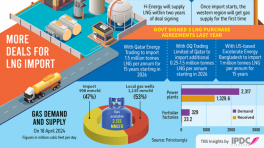Could the pandemic kill the United Kingdom?
Boris Johnson’s bungled coronavirus response could fuel calls for Scottish independence and Irish unification

The latest round of trade negotiations over the withdrawal of the United Kingdom from the European Union commenced on June 2, but British officials might have bigger problems at home. UK Prime Minister Boris Johnson and his government's underwhelming response to the coronavirus pandemic has been sharply criticized across the political spectrum, possibly giving further impetus to the Scottish independence and Irish unification movements.
For many nationalists in Northern Ireland, the pandemic has exposed the folly of running two separate health and political administrations on the same island, and, to them, this strengthens their demand for unification. "The behavior and the interests of the British government have caused a whole raft of people to think and review and analyze whether their best interests were served by that," said Niall O Donnghaile, the spokesman on uniting Ireland and Brexit for the pro-unification party Sinn Fein. "All of this is certainly pointing toward a bigger manifestation of an argument for unity."
In Scotland, a YouGov poll conducted in January already found a narrow majority of Scots in favor of independence for the first time since 2015. Every district in Scotland voted to remain as part of the European Union in 2016, and Brexit has forced some to change their minds on the question of Scottish independence. With support for independence on a knife-edge, even a marginal change in public opinion brought about by the pandemic could prove to be decisive.

Even so, plans to hold a second vote on the issue in 2020 have been put on hold for now, and the Scottish first minister, Nicola Sturgeon, has "been at pains to separate the public health issue from the constitutional issue," said Nicola McEwen, a professor of territorial politics at the University of Edinburgh and a co-director of the Centre on Constitutional Change.
The United Kingdom documented its first confirmed case of Covid-19 on Jan. 31, but the government was slow to implement an effective response. Even as neighboring countries were closing public spaces and enforcing social distancing regulations, London opted for a laissez-faire approach; it reportedly favored leaving the country open in order to deliberately infect a section of the public, thereby allowing the population to develop herd immunity over time. This idea was dispensed with after a startling report from epidemiologists at Imperial College London predicted that without mitigation measures, the virus could kill over half a million people in the UK alone.
The government was roundly criticized for appearing not to take the public's health seriously, and it eventually gave in to the pressure. On March 23, Johnson announced the immediate closure of all nonessential businesses, putting it in line with much of the rest of Europe, but only after a prolonged delay that may have been fatal. The recent row over Dominic Cummings—one of the prime minister's closest confidants whom Johnson refused to push out of office after it was revealed he had deliberately flouted the government's own coronavirus guidelines—emphasized London's lack of seriousness and reinforced the image of an incompetent British government bumbling its way through another crisis.
The Irish government's response to the coronavirus pandemic stood in sharp contrast to Britain's. Less than two weeks after reporting its first confirmed case of Covid-19 on Feb. 29, officials moved swiftly to close all schools, universities, and child care facilities. Days later, they canceled all St. Patrick's Day festivities across the country, and leaders canceled their annual high-profile holiday visit to Washington. Authorities have enforced strict social distancing regulations throughout the crisis.
On the night of St. Patrick's Day, Leo Varadkar, the Irish prime minister, assured "all those living in the shadow of what is to come—we are with you" in a widely celebrated address to the nation that received praise from across the political spectrum. Even Jamie Bryson, a leading loyalist activist known for his hard-line opposition to Irish unity, offered reserved praise for the leader, calling it "a 'fight them on the beaches' level speech. Decisive strong leadership. A rallying call to those in his country."
Public health is a devolved matter in the United Kingdom, meaning it falls under the purview of local authorities in Scotland, Wales, and Northern Ireland. But without clear direction coming from London, Northern Irish parties were left divided over how best to respond to the outbreak, taking stances that were strongly influenced by their respective views on the country's disputed constitutional question.
Sinn Fein—the country's largest nationalist party, which seeks to unify Northern Ireland and the Republic of Ireland—urged the administration to adopt Dublin's approach. The Democratic Unionist Party—the country's largest unionist party, which seeks to maintain the union with Britain—deferred to the British government. The result was a confused, disjointed approach that was only resolved when London finally took action.
The Northern Irish public's attitude to the British government's response has been overwhelmingly negative. According to a recent LucidTalk poll, 65 percent of respondents believed the UK government has been managing the emergency badly. "People were really frustrated with the slowness of the British government's approach," said Cliona McCarney, a communications worker for the nationalist Social Democratic and Labour Party. "We always thought it was going to be kind of bad, but it's probably been worse than we could've anticipated."
By contrast, polls show that large majorities of the public admired both the Irish government's response and Varadkar's leadership, figures that include substantial numbers of unionists.
But experts told Foreign Policy that one should be cautious about ascribing too much meaning to the public's reaction to the coronavirus. "There's a very important distinction to be made," said Dawn Walsh, a professor of politics at University College Dublin and an expert on Northern Ireland, "between having a friendly and cooperative relationship with your neighbors and having a change of idea as to whether you would like to secede from your current political union and join your neighbors." Unionists, she said, have been cultivating a close working relationship with the Irish government for years now.
Still, the pandemic is part of a wider trend that seems to suggest the public is warming to the idea of unity. Northern Ireland voted by a slim majority to remain in the European Union in the June 2016 Brexit referendum, fueling calls for unification with the republic as a way of preserving the country's EU membership.
In the UK general election in December 2019, nationalist politicians won more seats than unionists for the first time in the country's history, and in February, Sinn Fein gained international attention when it pulled within one seat of becoming the largest party in the Irish parliament. It will now likely lead the opposition to the next government in Dublin.
Polls paint an ambiguous picture about the level of support for Irish unity, and the results of different surveys can depend strongly on a variety of factors, including how the question is framed. A poll conducted by the University of Liverpool in December 2019 showed that only 28.3 percent of respondents believed that unification should be the long-term policy of Northern Ireland. However, when asked in February how they would vote if a border poll (referendum on Irish unity) were held the next day in a LucidTalk poll, 45.4 percent said they would vote for a united Ireland.

The pandemic is better understood as one part of a broader paradigm shift, rather than as an agent for change on its own. "There is an increased chance that there would be a border poll and that a border poll would pass particularly since the Brexit referendum, the rise of English nationalism, and Boris Johnson becoming prime minister," Walsh said.
As O Donnghaile, the Sinn Fein spokesman, put it: "When you look at Brexit, when you look at [the British government's] response to Covid, how could you not be going back and reevaluating some pretty fundamental things?"
The pandemic has also thrown into sharp relief the difference in leadership styles exhibited by Johnson and Sturgeon. The British prime minister has been criticized for his confused messaging and breezy approach in the crucial early days of the pandemic, missing five meetings of the UK government's emergency committee. Sturgeon, in contrast, has appeared solemn but resolute in her public comments, thanking the public for their collective efforts to help slow the spread of the virus.
As the UK slowly begins to emerge from lockdown, its devolved parliaments and assemblies in Wales, Northern Ireland, and Scotland all proved to be more cautious than Westminster. In May, when Johnson announced that restrictions would begin to ease in England as the rate of infection was beginning to fall, Sturgeon urged people in Scotland to stay home.
As in Northern Ireland, opinion polls have revealed that Scots hold a dim view of Johnson's handling of the pandemic. While 78 percent of people in Scotland think that the government in Edinburgh has handled the crisis well, just 34 percent say the same about Westminster. Comparing the performance of their respective leaders, the gulf widens further still, as 82 percent believe Sturgeon has handled the pandemic well, compared to 30 percent who say the same about Johnson.
The Scottish public has always rated its own government higher than the one in Westminster. "It's Scotland's own government, it has a bit of a halo around it," said John Curtice, a politics professor at the University of Strathclyde, but the disparity suggests that the actions of the Scottish government have hewed closer to public opinion.
Experts who spoke to Foreign Policy said it's too soon to tell how this could shape public attitudes toward Scottish independence, if at all. "Not everything is about the constitution in Scotland," McEwen, the University of Edinburgh professor.
But it's already becoming clear how the pandemic and the looming economic crisis could provide fodder to argue both for and against Scottish independence. Supporters may argue that had Scotland been independent, a lockdown could have been implemented sooner, while those in favor of remaining in the United Kingdom can point to the economic benefits of remaining in the union as the economic consequences of the pandemic escalate.
"It will be argued by those on the unionist side that the abilities of the UK to throw large amounts of government resources to keep the economy afloat would have been much more difficult for Scotland to achieve," Curtice said.
Fears of economic uncertainty proved to be decisive in the 2014 independence referendum in which 55 percent of voters opted to remain as part of the United Kingdom. As the global economy teeters on the edge of catastrophe, it could be even more difficult to persuade voters in Scotland to break away from Westminster's "broad shoulders."
"For the most part, dire economic circumstances are not the best basis for mounting an independence campaign," McEwen said. "That would be under normal circumstances but of course we have Brexit on the horizon too."
The United Kingdom is second only to the United States in its number of coronavirus fatalities, and bereaved relatives and doctors have already called for an inquiry into the government's response. But as missteps were made across the country, there may be limits to the extent that devolved governments can point the blame at Westminster. "All governments have a difficult track record to defend," Curtice said.
The Scottish government was criticized for its handling of an outbreak at a conference in Edinburgh in February organized by the sports brand Nike. Twenty-five attendees were later confirmed to have the virus, but details of the outbreak were not made public out of respect for patient privacy. According to the BBC, public health authorities in Scotland were made aware of the outbreak by March 2, but the Scottish government held off on banning mass gatherings until March 16 and didn't go into lockdown until March 23, the same day as restrictions were announced by the UK government.
Westminster's bungled response to the pandemic has fueled disillusionment with the Conservative government in Westminster. With no end in sight to the public health crisis, it's too soon to tell if voters will take out their frustration against Johnson's party in the next election or if it will fuel a more dramatic shift, spurring calls for Scottish independence and Irish unity. Coupled with Brexit negotiations and a global economic downturn, the coming years could fundamentally alter the way people in Scotland and Northern Ireland view their relationship with the United Kingdom.
Dan Haverty is an editorial fellow at Foreign Policy. Twitter: @dan_haverty
Amy Mackinnon is a staff writer at Foreign Policy. Twitter: @ak_mack
Disclaimer: This article first appeared on foreignpolicy.com, and is published by special syndication arrangement.


 Keep updated, follow The Business Standard's Google news channel
Keep updated, follow The Business Standard's Google news channel
















